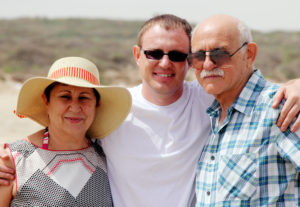As the parent of a grown child who is struggling through drug or alcohol addiction, your days may be filled with an odd sort of irony — maintaining your outward composure while worrying yourself sick on the inside over how you can help your child.
Somehow you manage to rise every morning, report for work, and complete your responsibilities on time without ever showing the world that you’re suffering on the inside. You may think you’re coping.
 You may think that you’re doing what has to be done to ensure your survival and the survival of your offspring, but that’s not necessarily true. There’s a fine line between respecting your child’s privacy and enabling them to continue on in their addiction, and this nearly impossible balancing act that you try daily to maintain could be putting you both at risk.
You may think that you’re doing what has to be done to ensure your survival and the survival of your offspring, but that’s not necessarily true. There’s a fine line between respecting your child’s privacy and enabling them to continue on in their addiction, and this nearly impossible balancing act that you try daily to maintain could be putting you both at risk.
It’s time to seek professional help.
As a parent, you’re in tune with your child’s actions more than anyone else on the planet, and you know when something simply isn’t right. Maybe you’ve seen the signs and recognized them for what they are, but were just afraid to confront your adult son or daughter. The symptoms of drug addiction can be subtle, after all.
The Mayo Clinic lists several:
- Problems finding success at work, holding down a job, or finding a job that’s worthy of a person’s talents and skills
- Lethargy and lack of motivation
- Secretiveness
- A sudden decline in caring about personal appearance or hygiene
- A change in spending habits
While each is a classic harbinger of drug or alcohol addiction, each could still be attributable to other factors such as a physical illness or depression. And as the parent, you’ve reflected on this many times: How do you accuse your child of something of which you’re not absolutely certain?
The answer is simple. You don’t.
 Angry accusations and blame-placing are detrimental to recovery. They typically achieve the opposite effect of the one you’re hoping to encourage.
Angry accusations and blame-placing are detrimental to recovery. They typically achieve the opposite effect of the one you’re hoping to encourage.
Your addicted child may dig in his heels twice as hard to prevent you from finding out what’s really going on, making him that much more resistant to seeking professional help.
Take care when sitting down with your grown child to discuss the issue:
- Remember that addiction is due to a disease, not to a lack of moral foundation. Anyone can become addicted, and nobody ever chooses this path willingly.
- Be concerned but not judgmental.
- Tell your child what you’ve noticed and what you suspect, but never in a condescending manner.
- Let him know that you love them unconditionally and will be there for them forever, regardless of their choices.
- Make them aware that help is standing ready when they needs it.
This may be the most difficult conversation you’ll ever have with your grown son or daughter, but it’s one that you must pursue if you suspect addiction. Your next course of action is to find help and support for yourself if you haven’t already. You’ll be better able to be there when the time comes if you’re feeling strong and powerful yourself.
Resources
- Mayo Clinic Staff, Drug Addiction Symptoms, MayoClinic.org, retrieved April 10, 2015 from http://www.mayoclinic.org/diseases-conditions/drug-addiction/basics/symptoms/con-20020970
